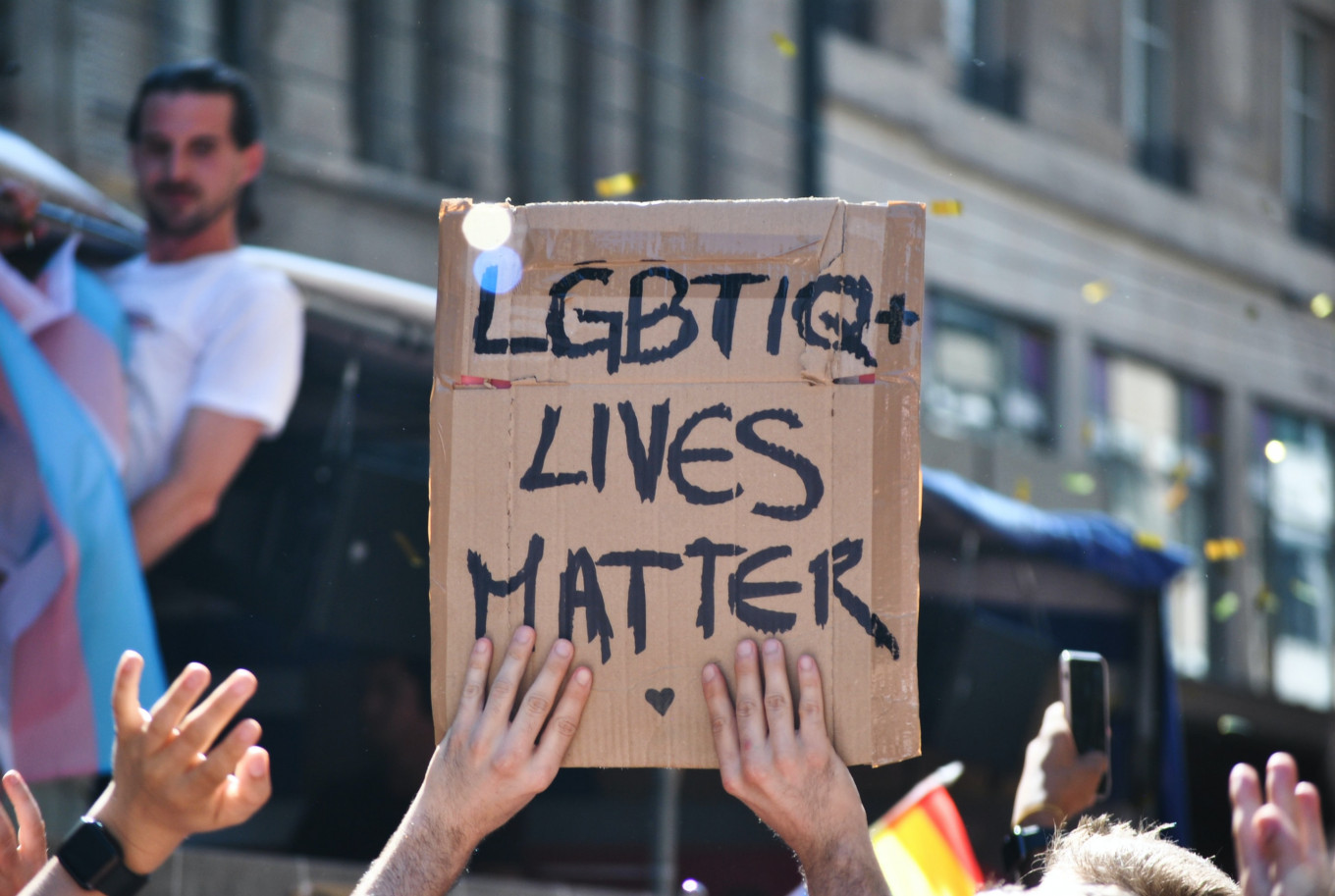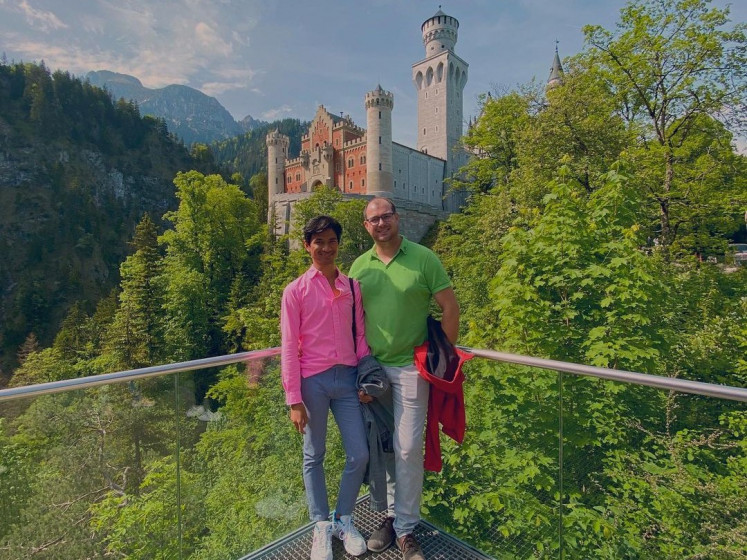From online discrimination to death threats: Why LGBTQ Indonesians leave their country
Discrimination, denial and even death threats has driven many LGBTQ Indonesians out of the country. While some remain, many have left to become foreign citizens in countries where their sexual orientation is more accepted.
Change text size
Gift Premium Articles
to Anyone

D
iscrimination, denial and even death threats have driven many LGBTQ Indonesians out of the country. While some remain, many have left to become foreign citizens in countries where their sexual orientation is more accepted.
Ragil Mahardika, a gay Indonesian who chose to become a German citizen after marrying his German partner, Frederik Vollert in 2018, is one of them.
"I don't think it's possible for me to live the life I am living now in Indonesia," Ragil told The Jakarta Post.
He said that lesbian, gay, bisexual, trans and queer (LGBTQ) individuals in Indonesia did not have any rights that are protected by the government, resulting in difficulty in the multiple layers of their daily existence, such as in dealing with official paperwork. Ragil added that working in government and private institutions remained a challenge and judgment from society and religious institutions were constant and consistent.
“This country still finds it difficult to distinguish between a bed and a person's skills, and it's no wonder that someone is fired from their job because he is gay. Why do you still associate a person's sexual orientation with his abilities? That's why a gay person will not be able to live in Indonesia, his future remains in danger," Ragil shared.
Recently, Ragil was in the spotlight after the Youtuber Dedy Corbuzier interviewed him and Vollert for an episode of the Youtuber’s immensely popular and controversial podcast series. Corbuzier took the video down after persistent backlash on social media, and in particular from governmental and religious communities. The video resulted in a spike in public anti-LGBTQ discourse.
The video, entitled A tutorial on being gay in Indonesia, had already been watched more than 6 million times before Corbuzier took it down and apologized – an act that many saw as leaving the LGBTQ out to dry after using them for clickbait.
"I expected there would be controversy, but I don't mind if the video is finally taken down, because that's Dedy Corbuzier's right," said Ragil diplomatically.
Prior to the video, Ragil had often voiced LGBTQ equality rights on his social media. When Corbuzier asked him to feature on a podcast, he accepted it in hope that his voice would be heard even more widely.
After the podcast first aired, Ragil experienced an increase in online harassment, including some who justified murdering him for religious reasons.
"I am used to being verbally abused on social media and even threatened with death several times, even though I am not a murderer nor a corruptor," he said.

Life of terror
The Post also spoke with Rainer and Eka, who moved to Canada a few years ago. Both chose to only use their first names to protect their privacy.
Rainer said leaving his country, friends and starting a new life in Canada was one of the toughest decisions he’d had to make, but various events that left him feeling frightened and unsure of his and his loved ones’ lives in Indonesia forced him to do so.
“The persecution of LGBTQ people has intensified, especially between 2015 and 2016. But the main thing is that in Indonesia we can never have a future as a family,” he said.
In 2016, while still living in Indonesia, Rainer received threats including death threats, through social media and text messages – simply for sharing an article he wrote citing the opinion of a well-known figure who supports LGBTQ equality, on a well-known online forum. In that forum, he was terrorized after revealing his identity and personal photos and his partner.
"I felt the safety of myself and my partner was threatened," he said.
In terms of equal rights as a citizen, it is impossible for Rainer and Eka to set up a bank account as a couple. Rainer also pointed to the difficulty in finding suitable family insurance for LGBTQ couples – an important issue, especially for those planning to have children.
Rainer and Eka were married in Ottawa in 2014. They returned to Indonesia two years later, but after facing too many challenges to living normally here, they soon returned to Ottawa permanently to live as Canadian citizens.
“Our wedding was very simple, only attended by witnesses, our friends who were our wedding photographers and officials from the country who registered the legality of our marriage,” explained Eka.
Eka also emphasized that in Canada, unlike Indonesia, the role of religious institutions had absolutely no role in the marriage affairs of its citizens.
"In addition, work and sexual orientation have never been linked, so that LGBTQ people here can work according to their skills without discrimination. Even if there are companies that question the orientation of their workers, the company can be prosecuted legally," he said.
Rainer added that in Canada their life as a gay couple was guaranteed by the state in terms of security, health and economy, and society, in general, has accepted gay or lesbian partners.
"Our equality is valued here unlike when we lived in Indonesia," he said.

Ignorance is not a bliss
Stigma remains close to LGBTQ individuals in Indonesia, including that they carry infectious diseases, are plagued with mental disorders, were “turned gay” because of trauma and even that their sexual orientation was the result of eating fried noodles (as Tangerang Mayor Arief R Wismansyah said in 2016).
"Equality of life and recognition of the LGBT community in Indonesia doesn't exist yet, how can a same-sex marriage be accepted?" Rainer said. There are still many regulations and laws in Indonesia that discriminate against LGBTQ people, one of which is the Pornography Law No.44 of 2008, Article 4 paragraph 1(a) which states that homosexuality is considered deviant sexual behavior.
In Canada, Rainer and Eka now feel they have a future, family and are able to have realizable dreams. Both work for a non-profit, and own three pets – two dogs and a cat they brought from Indonesia – and are saving to buy a house.
"I believe that LGBTQ friends in Indonesia still dream of being able to marry legally, but what they want most right now is equality, respect and recognition from the state and society," he said.
Meanwhile, Ragil hopes to continue advocating for the equality of LGBTQ rights in Indonesia.
"There are many other Ragils who may not want to speak out for fear of being discriminated against, afraid of being excluded from their social life, and even afraid of being fired from their jobs," he said.









